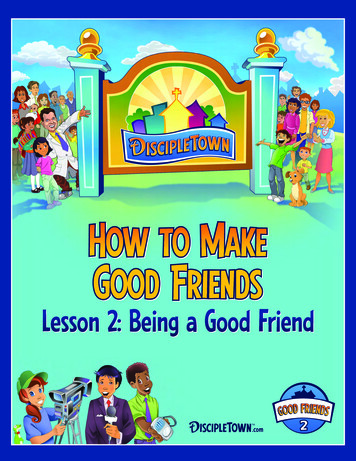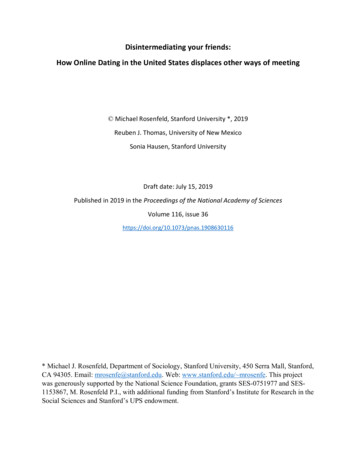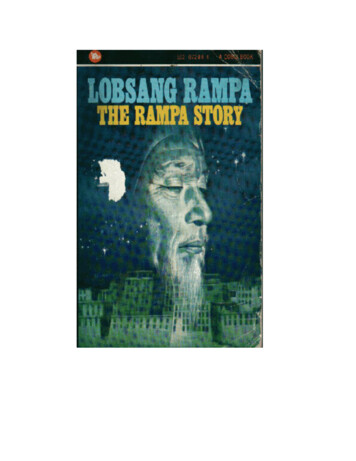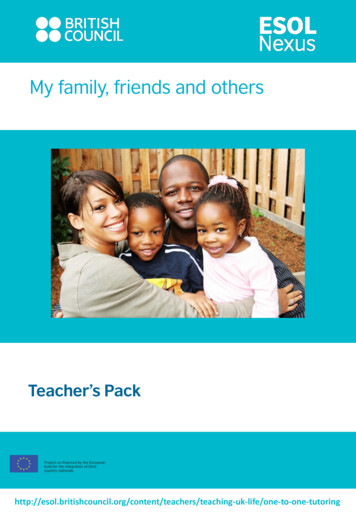
Transcription
How to MakeGood FriendsLesson 2: Being a Good FriendTM.com
TMHow to Make Good FriendsLesson 2—Being a Good FriendUnit SummaryThe ability to choose good friends is an invaluable skill for children to possess. Few thingswill shape their futures more significantly. The friends that children select will dramaticallyinfluence their character, their choices, their interests, their conduct—and the direction of theirlives!In this unit, you will help children become thoughtful and intentional about their friendshipchoices—yielding dividends that will last throughout their lives. You will guide your children tounderstand that friendships are not merely gifts from God, but lasting treasures that they mustintentionally seek.How to Make Good Friends—Lesson 2 2009, DiscipleLand. All rights reserved. Written by Karl Bastian / Kidology.orgLesson SummarySome friendships remain healthy for many years. Others fall apart, become counterproductive,or even volatile. When a friendship degenerates into a self-seeking exchange, it is headed fortrouble. This is reality because some people focus on what they can get from others rather thanon what they can give to others.Godly friendships are based on selflessness and genuine concern for another person’s wellbeing. All of us long for good friends, but sometimes we become concerned about what wewant in friends or what we can get from friends. We must first focus on how we can be goodfriends to others. Only then will we enjoy genuinely fulfilling friendships as God designed. Thislesson will help kids see that friendship works backwards—when they start by being goodfriends, they end up having goodfriends.Disciple TargetsIn this lesson, your children will.Know To have good friends, they must first be goodfriends to othersFeel Eager to have good Christian friends whogenuinely care about themDo Choose three children they know well—thenpractice being a good friend to each of them Paul’s Power Principle: If you wantto have good friends, first be a goodfriend.
SUPPLIESPowerPoint PresentationAs you plan your lesson, select PowerPoint slidesthat correspond to the lesson elements youchoose. In the “Slide Sorter” View, you can rearrange and/or delete the slides as necessary. Fordescriptions of the included slides and tips ontheir use, see the notes accompanying each slide.General SuppliesBibles, puppets, video projection (optional)Pencils, pens, paperSpark InterestWELCOME!: stickersLET’S PLAY!: blindfolds, notecardsCONNECT WITH YOUR KIDS: childhood photoExplore ScriptureKEYVERSE: noneInspire ActionDRAMATIZE THE POINT: actorsSPARK INTERESTHow to Make Good Friends—Lesson 2 2009, DiscipleLand. All rights reserved. Karl Bastian / Kidology.orgChoose from the following activities and ideas to engage kids and grab their attention.Welcome!—StickersCreate some stickers that say, “I’m the best friend a kid could ever have!” As the children arrive,welcome them enthusiastically and place the sticker on them. Say to each child, “Did you knowYOU are the best friend a kid could ever have? It’s true! I have a sticker to prove it!” and thenattach the sticker to the child.Let’s Meet-n-Greet!Greet someone you don’t know and learn his or her name. Tell this person who your bestfriend was when you were a little kid in preschool.Leaders, be sure to stop whatever you are doing to move through the audience and greet thechildren, especially those you do not recognize. Announce any birthdays for the week. (See theHow to Use DiscipleTown guide for quick and easy ways to acknowledge visitors and birthdays.)Let’s Worship!Reinforce the lesson by praising God for making each one of us unique while making all of uscapable of loving others.Recommended Song: The Greatest Commandment, public domain
Puppet IntroLeader & puppet introduce today’s lesson. You will find a scripted version of this intro at the end ofthe lesson. Supplies: puppetPuppet brings a list of suggestions for ways his friends could be better friends—includingleader. The list includes things like, “Come over and clean my room,” and “Give me candy,” and“Do my homework for me.” When leader asks why the puppet put this list together, puppetsays that he was just reflecting on all the ways his friends could improve on their friendshipskills. Puppet says, “What the world needs is more better friends!” Leader agrees and suggestsperhaps puppet could start by working on himself—what kind of friend he is. Puppet thinksthat is the craziest idea he has ever heard! Why would he first work on himself? How unfairwould that be—if he were a great friend before everyone else was? No! He needs to seeimprovement in his friends first, then he will start thinking about changing himself. Leader asksif that might be the problem, since everyone may be thinking that way. Puppet considers this,and says that maybe everyone should count to three and start to be a great friend on the countof three—at the same time. Have the audience count to three, and then say, “Okay, let’s all startto be better friends right NOW, so that the world can be a better place!”Let’s Play! —The Friend Factor Game ShowHow to Make Good Friends—Lesson 2 2009, DiscipleLand. All rights reserved. Written by Karl Bastian / Kidology.orgSupplies: blindfolds, notecards, pensSelect two boy and two girl volunteers from the class to compete in a game-show style competition. The audience participates by rooting for their team and guessing who will win. Set upthe stage with four chairs, two on each side, and a sign that says “The Friend Factor.” Ask eachchild two questions, one at a time, and have him or her write each answer on a notecard thatthey give to the emcee. Blindfold their partners and give them three options as to the answer(only one of which is correct). While the blindfolded partner guesses at the correct answer,have the non-blindfolded partner hold up a card with the number 1 or 2 or 3 (the number ofthe partner’s answer) as the emcee reads them. In this way, the entire class can see the correctanswer. If the blindfolded partner answers incorrectly, the opposing team gets the opportunityto guess which of the other two answers is correct. Then the emcee reveals the correct answer.If the team that was up answers correctly, award 100 points. If not, and the opposing teamanswers correctly, award the opposing team 50 points. Repeat this process for the opposingteam, and then switch roles/blindfolds.Question suggestions:1) My favorite movie is 2) My favorite soda is 3) I once got grounded for 4) My favorite subject in school is 5) If I were a professional athlete, the sport would be 6) If I were famous, it would be for 7) I hate when my mother calls me 8) Most people don’t know that I (or make up your own!)NOTE: You will want to plan ahead to make up other possible answers so that they soundplausible.
Connect with Your KidsThis object lesson primes the kids to think about value. Supplies: picture of yourself and achildhood friendHow to Make Good Friends—Lesson 2 2009, DiscipleLand. All rights reserved. Written by Karl Bastian / Kidology.orgDo you have a picture of yourself as a child with one of your childhood friends? Kids need tosee you as a child and realize that you faced the same struggles that they are going through.When I introduce a topic on friendship, I like to talk about my own best friend growingup—Andy. I talked about “Me and Andy” so much that my parents gave up on correcting mygrammar—as long as it was Andy I was talking about. With other friends, my parents wouldstill correct me, and I would have to say, “Peter and I.” Andy and I did everything together aschildren, and I’ve missed that friendship as life and geography grew us apart in time. I showpictures of the two of us and tell stories of some of our adventures—how much we enjoyedour friendship with each other, and what made him such a great friend. Just seeing a pictureof you as a child with one of your childhood friends can soften the children to you. It can helpthem relate to you and believe that you truly can relate to them, too.DiscipleTown VisitorFind a script version of this segment at the end of this lesson.Police Officer Pete: Officer Pete enters the room, comes up to the leader, and says, “Um, areyou [Leader’s Name]?” Leader says, “Yes,” and the officer asks to see some identification. Afterleader shows an ID, the police officer says, “I’m going to have to write you a citation.” Theleader acts shocked and asks, “But what for? I haven’t done anything wrong, and I didn’t evenspeed on the way to church!” The officer says, “That’s just it. We have started a new program atthe station, called Operation Good Friend. We realize that we have only been writing tickets forbad behavior, so now we are writing citations for good behavior. Well, we’ve been inundatedwith calls from children and parents reporting on what a good friend you are. Frankly, our lineshave been jammed. So I’m going to write you a citation for being a Good Friend. You keepthis up, and we are going to have to put you on Good Friend Probation and maybe send youto Good Friend Safety School. It’s obvious that you know how to be a good friend. I hope youare going to teach these boys and girls how to be good friends. We need more good friendsin this community. It is a huge need. If we had more good friends, crime would go down andthe overall goodness of the community would go up. I hope to be writing some Good FriendCitations on these kids soon!” Pete looks at the kids and points his pen at them. Then he thenrips the ticket from his pad, hands it to the leader, and exits. Leader acts a little baffled by thewhole encounter. “Good Friend Citation? Well, um, okay, I guess I’m glad I got one. And I’m gladpeople reported me, I guess. And today we are going to talk about how to be good friends.”
EXPLORE SCRIPTURESeize on the children’s interest and direct them into God’s Word.Let’s Search!—Bible DashSupplies: BiblesAsk all kids with Bibles to participate, or invite a few volunteers to come to the front. Aschildren hold Bibles closed with hands on covers, state the Bible reference twice, then on thecommand “SEARCH!” have the students race to locate the verse. Once they have a finger on theverse, they can stand and call out, “FOUND IT!” Have the first child read the verse aloud whileyou project the verse on a screen via PowerPoint. See suggestions below for comments oneach verse. Keep your comments brief and to the point of the lesson. Proverbs 17:17Proverbs 22:11Matthew 7:12Luke 6:31Luke 10:25-28Paul’s Power Principle:A friend loves at all times.Those who love and speak kindly will have friends.Treat others the way you want them to treat you.Golden Rule: Do to others as you would have them do to you.Second greatest commandment: Love your neighbor as yourself.If you want to have good friends, first be a good friend.How to Make Good Friends—Lesson 2 2009, DiscipleLand. All rights reserved. Written by Karl Bastian / Kidology.orgLet’s Learn!—Being a Good Friend 1 Corinthians 13:4-8aSupplies: “Mission Impossible” music, spy outfit, spy note as described belowEveryone wants good friends. The secret is to first learn to be a good friend! Did you eversee someone who is such great person that everyone wants to be his or her friend? Thatcan be you. Not because you are popular or smart or athletic, but because you are thesort of friend who makes people feel better about themselves and who sticks by themno matter what. If you decide, with God’s help, to be the kind of friend God wants youto be, soon you will have amazing friends and will enjoy life so much more. Let’s call it“Operation Good Friend” and declare you all Agents of the F.B.I. (Friend Bureau Incorporated).Suddenly, lights go out, strobe lights or siren lights flash, while the “Mission Impossible” orother “spy” theme music plays and a person dressed as a spy enters the room. Acting verysneaky, he works his way up to the front, delivers an envelope to the leader, and exits by adifferent route. Music stops, and room returns to normal. Leader, acting surprised, opensenvelope and reads instructions from the F.B.I. (Friend Bureau Incorporated).It has come to our attention at the F.B.I. that your church has become an official traininglocation for Operation Good Friend. We hereby authorize you, Senior Agent [leader’s lastname] to deputize the children as Junior Agents to infiltrate the world as good friends. Theworld needs more good friends. Instruct them in the three phases of successful friendship—IDENTIFY, LOVEIFY, PERSEVERIFY. Now destroy this note.The leader can have some fun destroying the note in some fun manner. We will leave that upto you to determine, so we at DiscipleLand are not liable for your zany ideas!Teach through the three points the F.B.I. suggested:
1) IDENTIFY—Phase One of Operation Good Friend is to consider the children in yourlife, in your neighborhood, church, and school, who could use a good friend. Who arethe good kids who may often be overlooked? Pray and ask Jesus to help you identifypeople who need a good friend, and ask God to help you be a good friend to them.2) LOVEIFY—Phase Two of Operation Good Friend is to practice learning how to loveyour friends as the Bible teaches. Open your Bibles to 1 Corinthians 13:4-6.3) PERSEVERIFY—Phase Three of Operation Good Friend is to never give up on yourfriends. Stick by them no matter what. Read 1 Corinthians 13:7-8a.Wow. Even when your friends mess up, let you down, disappoint you, or even make youmad, God’s Word says to protect them, trust them, hope for things to get better, andpersevere. That means to always stick with them. Love never fails. You will never stopbeing their friend no matter what. They can betray you, but you will never betray them.Friends like this are one-in-a-million. But isn’t that the type of friend you want to have?Don’t you want a one-in-a-million friend? Then be a one-in-a-million friend!I want to make a two-part promise to you: the first part of the promise is that yourfriends are going to let you down. The second part is that you are going to let yourfriends down. However, if you put Operation Good Friend into action, you will start tobuild friendships that will survive those bumps. You will build friendships that will lastyears to come!How to Make Good Friends—Lesson 2 2009, DiscipleLand. All rights reserved. Written by Karl Bastian / Kidology.orgSo, who wants to be deputized as a Junior Agent of the F.B.I. and start Operation GoodFriend this week? Raise your hand, and I will hereby deputize you with this prayer!Have the children raise a hand and then pray for them to identify some child this week towhom they can reach out and begin to build a stronger friendship with. Pray that God will helpthem demonstrate 1 Corinthians 13 love. That love is selfless and unconditional. And whenthere are bumps in their friendships, God will give them strength and patience to “perseverify”so their friendship will stand the test of time.Note: The use of the unusual words “loveify” and “perseverify” will help the lesson stick. I’vehad teenagers come back to me years later and ask for prayer when they were having troublewith a friendship and say to me, “I’m trying the loveify and perseverify phases, Pastor Karl, butit’s tough. Please pray for me.” What an encouragement to see the impact of a lesson theyheard so many years before called to memory and still being applied! Unique approachescreate “hooks” for truth to hang on for years to come!Suggested Bible NarrativeClick here to change textThe Good Samaritan—Luke 10:25-37Jewish people thought that a neighbor, or a friend, was someone who lived and acted the waythey lived. Jesus’ story illustrated that the true neighbor, or true friend, was the person whochose to help anyone who was in need. If we want to have friends, we need to be like the GoodSamaritan. We need to be the one who helps those in need and never the one who walks righton by. If we demonstrate love like this, we will never lack for friends.
Dee’s Disciple Tip: One way to be a good friend is to show an interest in other people and getto know them. When you meet a new person, it helps to have something in your mind toguide you in asking questions to know them better. If you want to “swim with a new friend,”remember the word “F.I.S.H.” and ask about their:F—Family (parents, siblings, pets, etc.)I—Interests (books, movies, video games, etc.)S—School (subjects, sports, clubs, etc.)H—Hobbies (collections, musical instruments, themes, etc.)KeyVerseTopic: The Secret to FriendshipReference: Philippians 2:3-4The KeyVerse for this unit does not directly mention friendship, but it is a wonderful verse thatreveals a secret about forming strong friendships. Encourage the children to memorize thisverse in the coming weeks, and consider giving a small prize during the final week of this seriesto every child who can recite this verse perfectly. Read the entire verse together a few times,but this week work on memorizing just the first half.How to Make Good Friends—Lesson 2 2009, DiscipleLand. All rights reserved. Written by Karl Bastian / Kidology.orgThis week’s key phrase is: HUMILITY. Ask the children what they think humility is. Explain thathumility is having an accurate opinion of yourself. A humble person is not always trying todirect attention on self. Instead, he or she gives attention to others. If you want to be a goodfriend, instead of talking about yourself, ask other people questions about their day and theirinterests.Say the entire verse several times, but still focus on the first half. Next week, you will focus onthe entire verse. However, be sure to include the Bible reference.Print each words on an individual sheet of paper and invite kids on stage to hold them. As theaudience reads the verse, select kids at random to return to their seats (and remove their wordfrom the verse) until there are no more kids on stage. Soon the children will be able to say theentire verse without any visual aid.
INSPIRE ACTIONEncourage kids to apply the Bible truth to their lives.Dramatize the PointAct this out or read as a story. Supplies: two male friends (one of whom should be fairly short),and several other taller actors, one of whom should be a really big bully (or man)How to Make Good Friends—Lesson 2 2009, DiscipleLand. All rights reserved. Written by Karl Bastian / Kidology.orgThe two friends are walking along when a group of “popular” kids comes up and offers tobefriend one of the two kids. One of the friends senses that these popular kids are not of goodcharacter. He says to the other, “We should go,” but the other friend says, “You go; I want morefriends.” The popular group says, “Yeah, if we aren’t good enough for you, then go!” The friendreluctantly and with sadness leaves, but watches from a distance. The popular group nowpretends as if the new boy is “one of them.” Shortly, someone asks the new boy to lend hima dollar, which he does. Then a really big guy comes up and demands the dollar. They hand itover, and when the boy protests, the bully grabs him by the shirt, threatens him and says, “Andwhat are you going to do about it?” At that, all the others flee and leave him alone—seeminglyto be beat up! Just then, the original friend returns and stands up to the bully. He threatensthe bully and says, “You’d better put down my friend, or you are going to regret it.” The bullylaughs and says, “And what are you going to do?” The boy boldly says, “I have no idea, butthat is my friend, so I’ll think of something.” The bully releases the boy and says, “You know, Igotta respect that. I wish I had a friend like that.” And he gives the dollar back. The other friendsays, “If you want a friend like that, all you have to do is ask.” The bully says, “Really? Then I’masking!” They all walk off together as new friends. The first boy says, “Maybe we should go findthose guys who took my dollar in the first place!” And they all laugh!Object Talks—The Dull and the Sharp KnifeSupplies: video projectionThe video clip for this lesson features Karl, the Kidologist, doing a short object lesson onProverbs 27:17. Just as knives can sharpen each other, so friends sharpen each other. Use thisshort teaching video to show the kids or to train a leader to do the talk “live.” Featured verse:Proverbs 27:17Let’s Talk!—Small Group DiscussionGo around the circle and invite everyone to say three things about themselves, one of which isfalse. The rest of the group must try to guess which is untrue. If you guess the lie, then you get apoint. If the person fools everyone, he or she gets two points. Have some fun learning new thingsabout each other.Small Group Questions:1) What do you think makes a good friend?2) When do you no longer want to be friends with someone?3) Have you ever lost a friend and regretted what you did?4) Is there someone you wish you could befriend again?5) Everyone share the name of a friend you need prayer for.
awardAwarded toonmonthdayyearDiscipleTown Super CitizenChoose a child to reward for an act of friendliness.forChristlikenesspresented byLet’s Pray!Dear Jesus, thank You so much for helping us to understand what it means to be a good friend. Wewant to have good friends, but You are helping us understand that we need to focus on being agood friend first. Help us to so focus on You and be so filled with Your Spirit that spiritual fruit justnaturally grows in our lives. Make us the kind of friend that people will want to have—friends whoare loving, joyful, full of peace, patient, kind and good, faithful and gentle, and controlled by YourHoly Spirit. We know that if we want to have good friends, we need to focus on being a good friend.With Your help, by becoming more like You, we can do that! That is our prayer Lord Jesus, and wepray in your Name, amen.Cy’s Challenge: Think of three things you could do this week to be a better friend—anddo them!Let’s Review!How to Make Good Friends—Lesson 2 2009, DiscipleLand. All rights reserved. Written by Karl Bastian / Kidology.orgIf you have extra time, use these review questions to keep the kids focused on the lesson untiltime to dismiss. A handful of candy will help you keep their attention. After each question, takea minute to reiterate the lesson point related to the question.1) If you want to have good friends, you musta good friend.2) What is the Golden Rule?3) What was Phase One of Operation Good Friend?4) What was Phase Two?5) Name three things the Bible says about the way Christians love others.6) What is Phase Three of Operation Good Friend?7) How do you get “one-in-a-million” friends?8) Use the word FISH to remember questions to ask about people you want to get to knowbetter. What do the letters of the word FISH remind you to ask about?
For the HomeDiscipleTown Table Talker: Give each child a copy of this week’s DiscipleTown Table Talker. Besure to show them how to put it together and encourage the kids to ask their parents to leadfamily devotions three times this week.Parent Email: Copy and send the email below to help your parents connect with their kidsduring the week. Send them early in the week, but not on Sunday. As a courtesy, be sureparents have opted to receive these emails. Review and edit as necessary to reflect the lessonelements you have used. You can also find this email as a Microsoft Word document in yourdownload bundle.Dear Mom and Dad,Our children’s church series, How to Make Good Friends, has pointed out that the friends thatchildren choose will significantly influence their character, their choices, and therefore the direction oftheir lives! The more we equip kids to be intentional in this area, the better.Every child longs to have good friends. However, godly friendships are based on selflessness andgenuine concern for the other person’s well-being. Children must first focus on how they can be goodfriends to others. Only then will they establish genuinely fulfilling friendships as God designed. ThisSunday’s lesson helped kids see that friendship works backwards—when we start by being goodfriends, we end up having good friends. Your child was challenged with some specific ways he or shecan be a better friend to other children.If you want to talk with your child about the lesson, here are some review questions:How to Make Good Friends—Lesson 2 2009, DiscipleLand. All rights reserved. Written by Karl Bastian / Kidology.org[insert review questions that apply to the segments you used.]For a great family discussion on the topic of friendship, don’t forget to take a few minutes after mealsthis week to use the DiscipleTown Table Talker. No preparation is necessary. Just follow the easyinstructions on the guide your child brought home.Partnering with you to form young disciples,[Your Name]10
BONUS MATERIALSUse these options to extend your time or as substitutes for the ideas above.Chip’s Snack Time!Supplies: peanut butter or whipped cream, bananas, candy sprinklesSlice bananas into ½-inch chips. Spread each with peanut butter (or whipped cream if yourchurch has a “no peanut butter” policy), and just a touch of candied or chocolate sprinkles. (Letthe children add the sprinkles.)Note: Bananas can be a choking hazard for younger children.Group ActivityEveryone has heard of an “Insult Fight”—consider having a Compliment Fight! It can either bea skit between two leaders, or you could encourage the children to pair up or group into threesand for two minutes take turns complimenting each other. Encourage them to do it in the spiritof an “Insult Fight.” You may want to model one first. Two leaders can demonstrate:How to Make Good Friends—Lesson 2 2009, DiscipleLand. All rights reserved. Written by Karl Bastian / Kidology.org“You are good at teaching.”“Oh, yeah! Well, you are good at singing.”“Oh, yeah! Well, uh, you are a great artist.”“Oh, yeah! Well, I heard you were on the honor roll as a kid!”“Oh, yeah!? Well, I love your momma!”Dee-Cy-Paul Application ScriptAt the end of this lesson, you will find a special puppet script relating to worship and featuringDee, Cy, and Paul. Dee, Cy, and Paul puppets are available at DiscipleLand.com11
Puppet Intro—Better FriendsDIRECTOR’S NOTESThe words in italics are notes for you and your puppeteers;they are not to be read aloud.You will need a list on a piece of paper for puppet to hold.Puppet*: Well, I’ve made my list!Leader: What list?Puppet: Well, I know now that Jesus is the best friend ofall, but my other friends still need improvement.Leader: They do, huh?Puppet: Yep. So I made a list of suggestions for ways allmy friends could become better friends.Leader: Well, that’s.[Glances at list.] Wait a minute, is thatmy name?Puppet: Like, I said—all my friends.Leader: So what’s on this list?Puppet: Oh, the usual. “Be nicer to me.”Leader: Uh huh.Puppet: “Come over and clean my room.” “Give me candy.” “Do my homework for me.”Leader: I’m not sure those items necessarily make fora better friend.Puppet: They would to me!Leader: So why did you put this list together, exactly?Puppet: [Does a double take. Pause.] What?Leader: Try working on yourself to be a better friend.Puppet: That’s the craziest idea I’ve ever heard! Whywould I work on myself first? What good would it do to bea great friend before everyone else was? Nope—I need tosee improvement in my friends first, then I’ll start thinkingabout changing myself.Leader: You know, that might be the problem.Puppet: What do you mean?Leader: Well, what if everyone is thinking like you are?Waiting for someone else to change first?Puppet: Hmmm. I hadn’t thought of that.Leader: So, what do you think?Puppet: I think we should start at the same time. [To audience.] Hey kids, on the count of three, let’s all starting being a great friend to others.Leader: That’s a great idea, [puppet name].Puppet: One.two.THREE! Okay, let’s all start to be betterfriends right now, so that the world can be a better place!*PUPPET: Develop a puppet character to use regularly.The children will get to know the personality andenjoy these regular visits. Dee, Cy, and Paul puppets areavailable at DiscipleLand.comPuppet: Well, everyone can improve on their friendshipskills.Leader: I agree.Puppet: What the world needs is more better friends.Leader: You’re right.Puppet: Of course I am!Leader: So, why not start with yourself?How to Make Good Friends—Lesson 2 2009, DiscipleLand. Permission granted to reproduce for volunteers.
DiscipleTown Visitor ScriptDIRECTOR’S NOTESThe words in italics are notes for you and your volunteers;they are not to be read aloud.You will need a police costume and a ticket pad. As leader finishes story from Connect with Your Kids, Police Officer Petecomes up.Police Officer Pete*: Excuse me, are you [leader name]?Leader: Yes, officer. Um, is there a problem?Pete: Can I see some identification, please?Leader: [Digs for his wallet.] I know it’s here somewhere.Ah, here you go.Pete: ID confirmed. [Gets out his pad and begins writing information off the ID card.]Leader: What are you doing, officer?Leader: Wow. I had no idea.Pete: You keep this up, and we are going to have to putyou on Good Friend Probation and maybe send you toGood Friend Safety School. It’s obvious that you knowhow to be a good friend. I hope you are going to teachthese boys and girls how to be good friends. We needmore good friends in this community. It is a huge need. Ifwe had more good friends, crime would go down and theoverall goodness of the community would go up. [Pointshis pen at audience.] I hope to be writing some Good FriendCitations on these kids soon! [Rips the ticket from his padand hands it to the leader and exits.]Leader: Good Friend Citation? Well, um, okay, I guess I’mglad I got one. And I’m glad people reported me, I guess.And today we are going to talk about how to be goodfriends.Pete: I’m writing you a citation, sir.Leader: What?!! [Pete gives leader a hard look. Leadershrinks.] What I
Puppet considers this, and says that maybe everyone should count to three and start to be a great friend on the count of three—at the same time. Have the audience count to three, and then say, “Okay, let’s all start to be better friends right NOW, so that the world can be a better place!” Let










